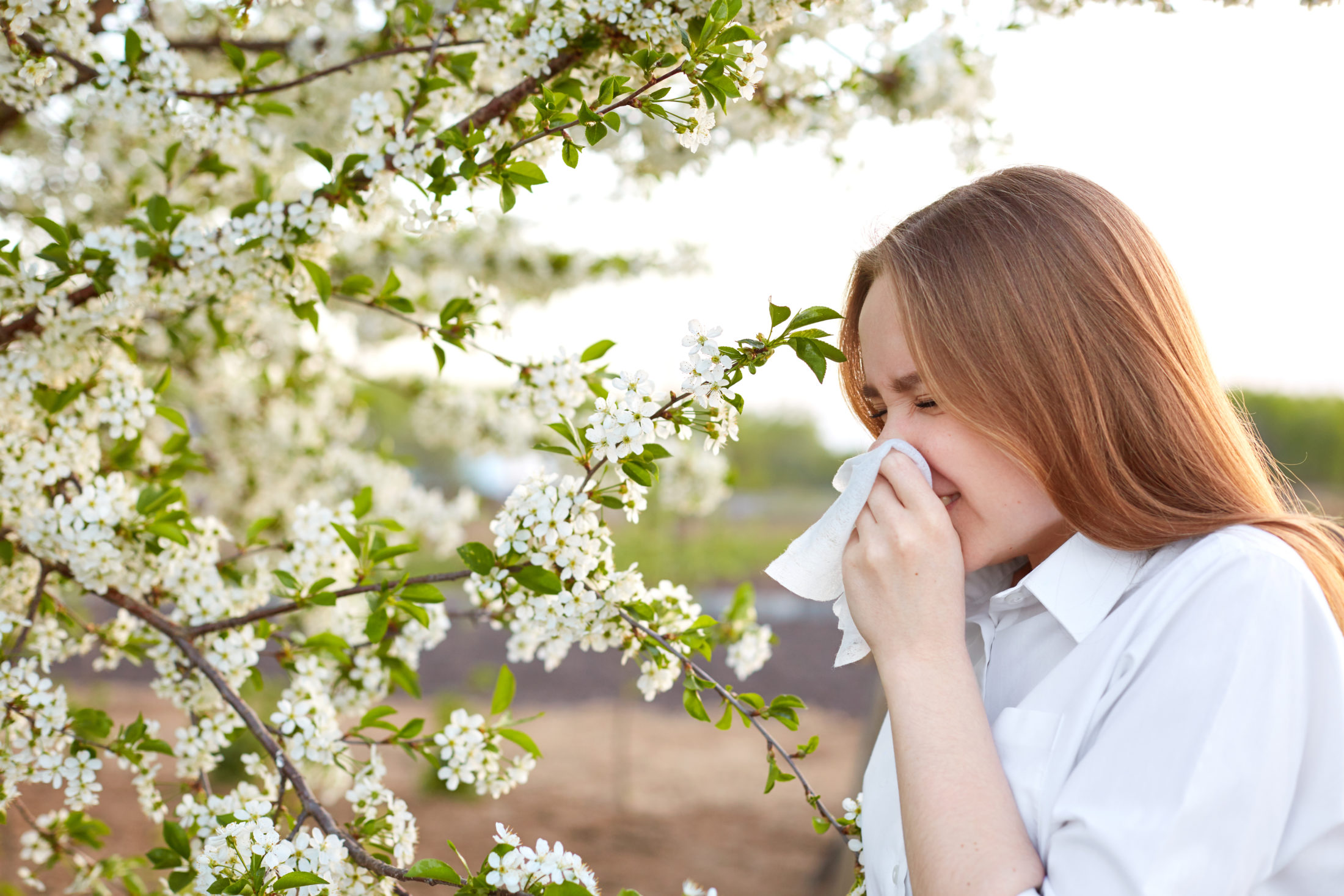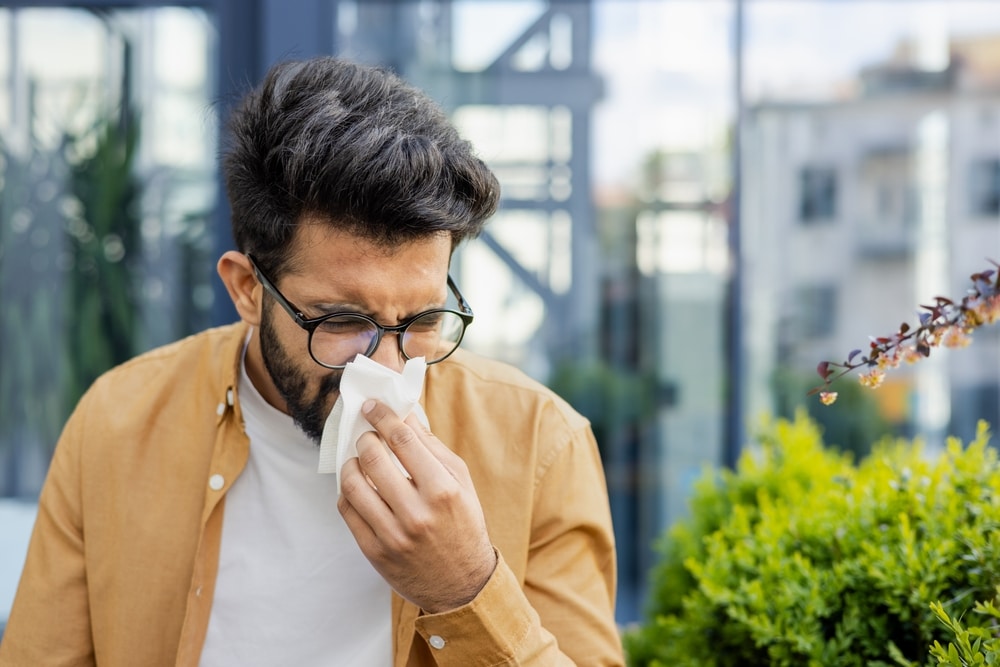Antigens and allergens are the substances that drive those of us with allergies crazy. They’re hard to avoid, particularly if the antigen is something like tree, grass or weed pollen.
At St. Louis Sinus Center, we have a better idea, two actually. Those ideas include sublingual and subcutaneous immunotherapy, more commonly known as allergy drops and allergy shots. Immunotherapy addresses the underlying cause of your allergies, not just the resulting symptoms.
What Are Allergy Shots?
Allergy shots, clinically known as subcutaneous immunotherapy (SCIT), have been used for over 100 years. The FDA has approved numerous extracts used for these shots. Patients receive allergy shots when trying to treat allergic conditions affecting the nose and eyes, ears, and lungs. They are effective for heading off reactions to many allergens, including trees, grasses, weeds, molds, dust mites, and animal dander.

How Do Allergy Shots Work?
Allergy testing first confirms what the patient is allergic to. Then a an small amount of the allergen will be injected into the patient’s arm. Injections are typically given once a week with the potentency increasing over time. After 3-5 years patients will develop immunity to the allergens, resulting in significant symptoms reduction.
Allergy Shots Candidates
Patients that are allergic to the following are candidates for allergy shots which are effective in heading off symptoms of allergies.
- Dust mites
- Grasses
- Pet dander
- Pollens
- Weed
- Other typical allergens
At What Age Can You Start Getting Allergy Shots?
Allergy shots may begin as early as age five. This treatment should always be performed by a board-certified allergy specialist. Studies indicate that allergy shots can be safe and effective for school-aged children and teens. Some may develop minor, localized reaction after treatment.
Benefits Of Allergy Shots
Allergy shots are a type of immunotherapy that treats most possible allergens. The allergy shots treat the root cause of the allergy, rather than simply dealing with the symptoms. This is more practical over the long-term.
The goal with shots is to give the patient exposure to the allergen in small doses, gradually increasing the amount over time. Eventually, the patient can build up immunity to an allergen that may have bothered them for decades.
How Many Times Can I Receive Allergy Shots?
Patients usually notice a decrease in symptoms during the build-up phase of immunotherapy treatment. More significant improvement can take up to 12 months on a maintenance dose, which patients may continue for 3 to 5 years. Studies indicate that the vast majority of patients who stay on their immunotherapy program as recommended achieve lasting resistance to their trigger allergen.
What Happens if You Don’t Finish Your Allergy Shots?
Immunotherapy works over time and through multiple doses scheduled at regular intervals. Each patient may need a specific number of doses to achieve prolonged resistance to allergens. Patients may stop their treatment at any time during their buildup phase or maintenance phase. However, it is likely that, if they do, their symptoms will return.
Can Allergy Shots Cause Allergic Reactions?
Most people who receive allergy shots do not experience adverse reactions. However, because the shots do contain known allergens, there is a potential for the following:
- Local reactions such as swelling, redness, or irritation on the skin. If a local reaction occurs, it usually does so within hours of receiving the shot, and it usually fades soon after.
- Systemic reactions are much less common than local reactions. These may be more concerning, though, and may include nasal congestion, sneezing, hives, wheezing, chest tightness, or swelling of the throat.
- Anaphylaxis is a rare reaction to allergy shots. Studies indicate that this reaction usually occurs within 30 minutes of treatment, which is why patients remain in the office for that time after their allergy shot.
Patients receiving allergy shots often notice that reactions fade or go away completely when they maintain regular weekly or monthly scheduling for their immunotherapy.
How Many People Are Commonly Affected By Seasonal Allergies?

Allergies are the 6th leading cause of chronic illness in the U.S. According to the Centers for Disease Control and Prevention, more than 24 million people suffer from seasonal allergies. The American College of Allergy, Asthma & Immunology puts that number at closer to 50 million.
What Is Immunotherapy For Allergies?
Antihistamines and such simply try and calm allergic symptoms such as itchy, watery eyes. Immunotherapy instead gives the allergy sufferer a minute dose of what he or she is allergic to through a shot. Dosages are gradually increased until the patient develops a tolerance to the allergy-causing substance.
Are Their Alternatives To Immunotherapy?
Allergy drops seem to be the best alternative to allergy shots in managing the symptoms of certain allergies. Without immunotherapy, allergy-sufferers may rely on oral medications and exaggerated avoidance to manage symptoms. Immunotherapy can take time, but it offers the best rates of success for prolonged relief.
How Long Does It Take Immunotherapy To Calm My Allergies?
Allergy shots are best when viewed as preventative, not reactive. Unlike a penicillin shot that is a response to an infection, immunotherapy seeks to slowly build up tolerance and immunity to an allergen. How effective they are immediately is variable by the patient. These shots aren’t meant to be delivered as instant allergy fixes.
Risks Of Immunotherapy Shots
With allergy shots, there is a small risk of anaphylactic shock, a severe allergic reaction. This can happen shortly after the injection is given. For that reason, allergy shots can only be given in a doctor’s office.
Schedule A Consultation
If you have allergies and want to learn more about immunotherapy or allergy shots, please call 314-450-7720 to schedule a consultation with our experienced team at our office’s in St. Louis and Festus, MO. You can change your life with nose surgery and you can take the first step by speaking with us.
FAQs
How soon after receiving a shot can I leave the clinic?
After you receive an allergy shot, you may need to stay at the clinic for about 30 minutes. This observation period allows the medical team to monitor you for any signs of a reaction, such as redness, swelling, or more serious symptoms like difficulty breathing. While severe reactions are rare, this waiting time is an important safety step. You can bring a book, check emails, or relax in the waiting area during this time. Once the staff confirms you’re doing well, you’ll be cleared to go about your day.
Are there any lifestyle restrictions during the course of allergy shot treatment?
You can continue most of your usual activities while receiving allergy shots, but you should avoid strenuous exercise, heavy lifting, or activities that raise your heart rate significantly for at least two hours before and after each appointment. Increased circulation from intense activity can potentially speed up how allergens spread through your system, raising the risk of a reaction. You should also let your provider know if you’re feeling unwell, have a fever, or are experiencing asthma symptoms on your treatment day, as they may recommend delaying your shot.
What happens during my first allergy shot appointment?
Your first visit begins with a review of your allergy test results and your personalized treatment plan. You’ll discuss your medical history, any current medications, and what to expect over the coming months. The allergy team will prepare the first injection, which contains a small, diluted amount of your specific allergens. The shot is usually given in the upper arm. After the injection, you’ll stay in the office for the observation period so staff can ensure you’re tolerating the dose well. Before leaving, you’ll receive guidance about your future visits and what to watch for at home.
How do allergy shots compare to over-the-counter allergy medications?
Over-the-counter allergy medications work by temporarily blocking or reducing your symptoms, but they don’t address the underlying immune response. Allergy shots, on the other hand, gradually train your immune system to become less sensitive to allergens, offering long-term relief. While medications may need to be taken daily during allergy season or year-round for perennial allergies, allergy shots can lead to lasting improvement even after treatment ends. Many patients who complete allergy shot therapy report needing fewer or no medications in the future.
Do allergy shots work better for some allergens than others?
Allergy shots are highly effective for environmental allergens such as pollen, pet dander, dust mites, and mold spores. They also work well for certain insect stings. However, they are not used for food allergies or chemical sensitivities. The effectiveness for each person depends on factors like the type and severity of allergies, adherence to the treatment schedule, and your body’s individual response.
Can children with multiple allergies receive shots for all of them at once?
Yes, children can receive treatment for multiple allergens at the same time. Your provider can create a custom mixture containing the relevant allergens in safe proportions. This approach allows your child to build tolerance to several triggers simultaneously. The treatment plan will be carefully monitored and adjusted to ensure safety and effectiveness.

